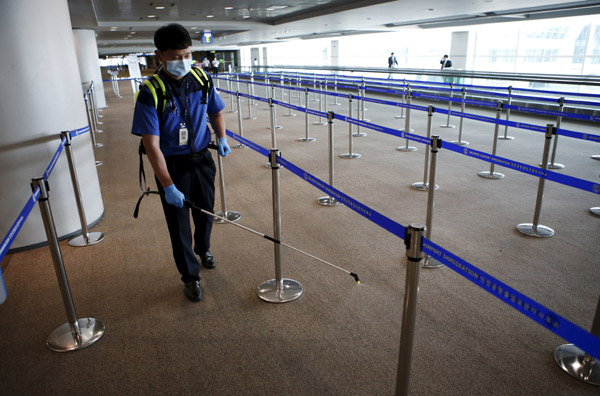Rising MERS infections, deaths overshadow S. Korean economy
(Xinhua) Updated: 2015-06-15 16:15
 |
|
An employee wearing a mask to prevent contracting Middle East Respiratory Syndrome (MERS) disinfects the floor at the Incheon International Airport in Incheon, South Korea, June 14, 2015. [Photo/Agencies] |
Retain sales fell in the first week of June compared with a month earlier and credit card payment was down 5.5 percent earlier this month compared with the same period last month, South Korean Finance Minister Choi Kyung-hwan told lawmakers on Monday, according to a report by Yonhap.
The tourism and leisure industries were the hardest hit, the Yonhap report quoted Choi as saying.
There is need to guard against excessive anxiety and to limit the economic fallouts, Choi added.
The South Korean central bank cut its policy rate Thursday to an all-time low of 1.5 percent in case that the unabated MERS may erode the already lackluster economy.
The MERS outbreak also appears to be behind a life-style change in the country: more South Koreans are buying groceries online so as to avoid trips to shops and supermarkets.
The three leading grocers in South Korea, namely E-Mart, Home Plus and Lotte Mart, all recorded substantial increase in online sales since the outbreak began.
E-mart saw its online sales soar 63.1 percent between June 1 and June 11, compared with the same period a year earlier. The number of orders also jumped 51.9 percent.
Home Plus reported a 48.1-percent increase in online sales and a 37.5-percent rise in terms of order value. Lotte Mart saw its online sales grow 26.8 percent compared with a 10-percent sales slump at actual shops.
And away from South Korea, cautionary measures are also being taken against the MERS virus.
Slovakia on Saturday hospitalized a 38-year-old South Korean citizen who was suspected to have been infected. But local authorities said Sunday three out of four tests were negative for the virus and the suspected patient will undergo further tests.
As a populous neighboring country of South Korea, China has also acted to in the past week to prevent MERS infections.
Medical institutions have been asked to "strengthen monitoring of fever and pneumonia cases with unidentified causes in order to detect, diagnose and isolate MERS patients as early as possible."
China's quarantine and inspection, health and tourism authorities also renewed a joint circular to prevent MERS cases from entering the country.
China's civil aviation regulator has also ordered all airline companies to strengthen prevention and control of the MERS for flights between China and South Korea.
- Tests show South Korean in Slovakia probably does not have MERS
- Hospital at epicenter of MERS suspends services
- Airlines cut flights to South Korea as China steps up MERS alert
- MERS infections in S.Korea increase to 145 with 7 more cases
- WHO advises S.Korea to ban all MERS suspects' overseas travel
- S. Korea reports 11th death from MERS outbreak
- China's aviation regulator orders enhanced MERS control
- MERS quarantine ends for 75 under observation






